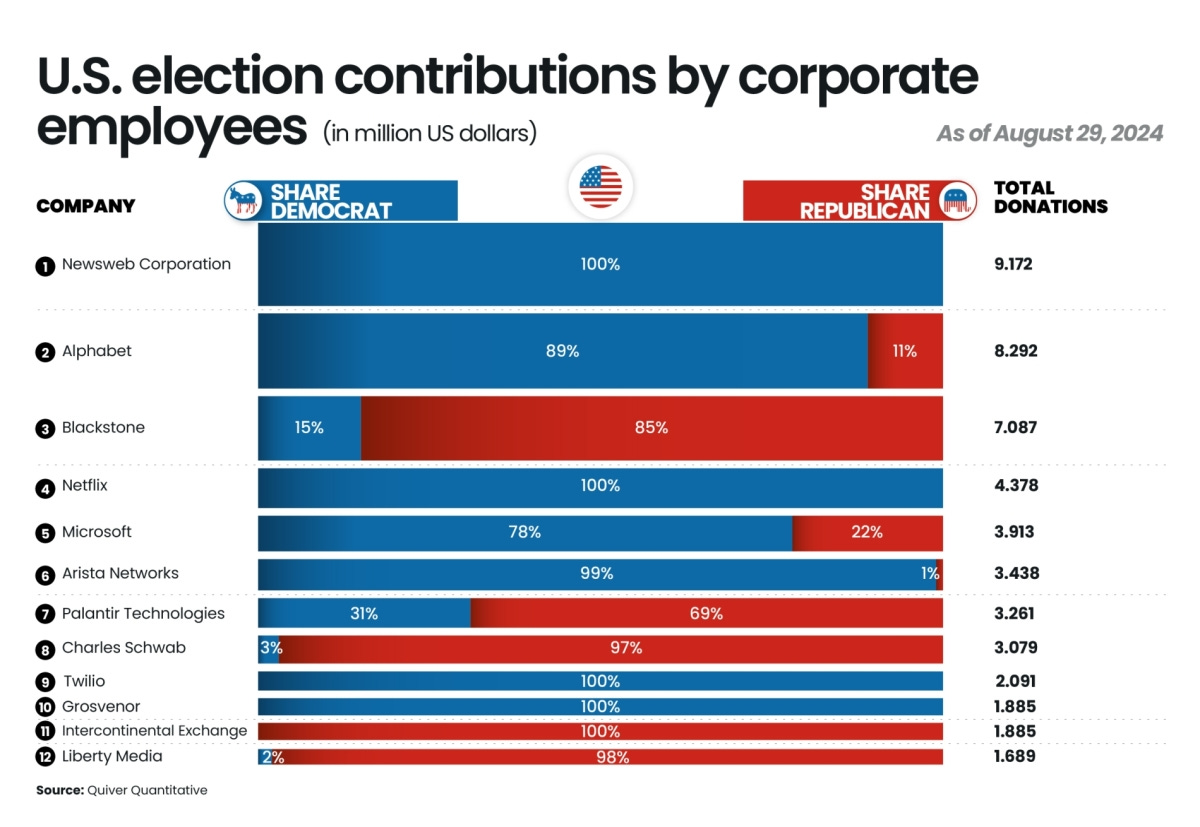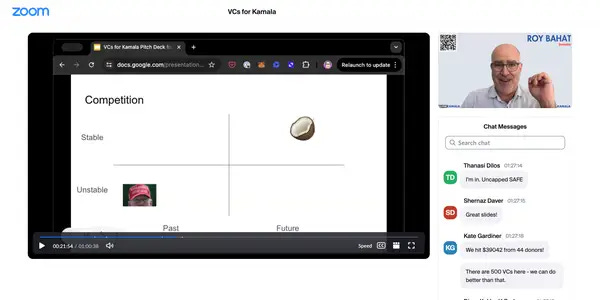The Case For A Democratic Oligarchy
Why Ezra Klein Should Support Lobbyists, Bankers, and Pharma
Imagine for a second that all the degrowthers and socialists disappeared from the Earth. Who’s left in the Democratic party? Joe Biden moderates? Upper class millenials? Bill Kristol?
Because the internet is right wing and populist, while Democratic moderates are covert and elitist, the answer remains a mystery. But a few important data points should help solve this mystery. Remember the infamous VCs for Harris call last summer? Despite the tech right movement, more VCs donated to Harris than Trump. Democrats raised more from corporate donors than Republicans. Upper-class professionals voted for Harris.
The answer is that quite a lot of capitalist normies support the Democratic party, either for geographic reasons (finance), self-interest (pharma), or education polarization. Democrats are the party of the educated. They’re the party that reads. They’re the party of institutions. Abundance Democrats triumphing over degrowthers and socialists is already a long shot, but it’ll never happen if Klein doesn’t embrace this existing power base.
The choice sounds harder than it really is. Democrats don’t actually have a choice between being the populist party or being the oligarchy party. They have the choice between being the oligarchy party or being the aristocracy party — the party of elites that govern well for everyone.
The debate within the Democrats is between whether that means they’re the party of moral crusades against the instincts of normal people, or whether it means they’re the party of autistic policy reports about getting good governance right. Democrats are stuck between a rock and a hard place. Republicans have become so associated with populism that the only options Democrats have to appeal to populism are versions of socialism that makes the destruction caused by Trump’s tariffs look like a rounding error. The realistic solution for Democrats is to embrace being the party of the responsible elite — the party of Ezra Klein.
Democratic strategists criticize Harris for embracing “Democracy in Darkness” rhetoric instead of focusing on economic issues. Their critique isn’t even that it’s necessarily unpopular — just that general election voters tend not to care about it. That’s fair enough when you ignore political economy, but when you think about who “Democracy in Darkness” rhetoric appeals to, I think Democratic politicans are right to embrace it. It appeals to an upper-class activist base, displacing even more unpopular positions on race, sex, and climate.
The case only becomes stronger Klein’s goal — getting government to build more, faster. Abundance, the book, makes it clear that those progressive groups are part of the problem when they impose requirements for housing, energy, and industrial policy that get in the way of government projects being done at all. Shafting the groups isn’t just a strategic victory — it’s a practical victory.
If there ever was a time for Democrats to shake off the radical yoke, it’s now. The party is in a mood for change. Trump is polarizing institutional small-c conservatives against him. The Klein faction is ascendant. But to win on policy, Klein needs more than to win in the ‘marketplace of ideas’. He needs to reshape his party’s coalition — who Democrats hear from and answer to.
I’ve personally gone to several Abundance conferences and made it a priority to talk to everyone. There’s usually a few representatives from large companies, trade organizations, and lobbying firms around. Democrats are incredibly shy about this. I can’t imagine why! From an Abundance perspective, they’re the heroes of the Democratic party, from the Clinton era to today. They’re the ones who have held back the expansion of the “everything bagel”, at times even more effectively than Republicans have.
At the heart of the Democrats’ scarcity problem is that Democratic interest groups just don’t personally benefit much from abundance. Public sector unions, NGOs, and rich divorcees are all sheltered from the consequences of their actions. When Ralph Nader makes the world poorer by blocking public development, he rakes in donations that make Ralph richer. When longshoremen rally for needlessly complex and overegulated ports, they make America less competitive while giving themselves more of a competitive advantage — by putting port operations out of reach of normal people.
Left-wing lobbyists are unsung heroes of the Democratic party. Center-left business interests have created an entire infrastructure of progressive true believers who nonetheless have their personal incentives tied to growth. This was an incredibly difficult challenge of logistics and politics. It exists in a few countries around the world, and none to the extent it exists in America. The progressive business complex is a marvel to observe up close. There’s at least an argument that they’re the primary reason Democrats aren’t a European-style socialist party.
Much of long-term political change — what Klein and Thompson call a change of political order — is about shaping incentives for politicians, regulators, and activists. The real victory for Ezra Klein will come by shaping the incentives for cooperating with different Democratic interest groups. Right now, even moderates act like it’s a moral compromise for politicians to work with the most reasonable people in the Democratic coalition while it’s assumed that politicians will bow to the least reasonable people unless they take a brave, risky stand. That narrative is completely backwards. Democrats have failed to build, failed to win (general) elections and failed to build self-confidence precisely because they’ve capitulated to the people in their coalition who win when everybody else loses.
Let’s end with the beginning. Imagine for a second that all the degrowthers and socialists disappeared from the Earth. Democrats would probably lose the next election, but they would have the freedom to improve their platform. The shortest road to victory might be to take Klein and Thompson’s advice and become a party of functioning institutions. In the long term, that might leave the Democrats better off, materially and politically.
Back in reality, there’s no changing who the Democratic party represents without changing who manages the Democratic party. Klein and Thompson actually have a harder challenge ahead of them — not just rebuilding the Democratic party, but taking the initiative to forcibly replace elements of Democratic coalition.




It seems like the unions might switch to being Trump supporters, since so many of their members are. Or at least some unions. So maybe the Democratic coalition will realign a bit.
The beating heart of the Dem coalition is public sector unions + single women.
This includes not just direct public sector unions like the teachers union. It also includes highly regulated and subsidized sectors like healthcare, which are a kind of "guild" or quasi public sector union.
Single women include both welfare mamas and corporate professional women with bullshit jobs. Neither is very "pro-growth".
Most of your men that like building things, like actual things in the real world of atoms, are moving towards the right. Ezra talks about building houses. How do you think someone who ACTUALLY BUILDS HOUSES votes?
I just went onto open secrets for the largest homebuilder I know in the area. It's split 75% R / 25% D.
Look, if you want growth its easier to move to Florida or Texas and become a Republican then it is to try and change the Democrats, especially where they have one party rule.